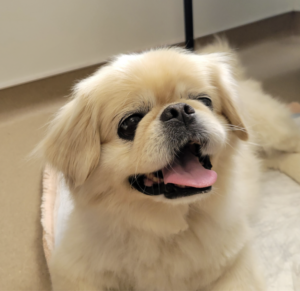Lucy was presented to our Oncology service for consultation following a diagnosis of large cell lymphoma by her primary care veterinarian. In June 2023, Lucy was presented to her primary care veterinarian for lethargy and left-sided facial swelling. The owner elected to treat empirically for an infectious/inflammatory process with antibiotics and a non-steroidal anti-inflammatory medication. Lucy initially had a favorable response to empirical therapy, but the swelling returned in October 2023. Lucy was evaluated by her primary care veterinarian who appreciated generalized peripheral lymphadenopathy during her exam. Bloodwork revealed a non-regenerative anemia (26.1%), lymphocytosis (8.97K), monocytosis (3.18K), thrombocytopenia (97K) and elevated ALP (459). Cytology of her lymph node was most consistent with a diagnosis of large cell lymphoma and she was referred to PVESC at that time.
In June 2023, Lucy was presented to her primary care veterinarian for lethargy and left-sided facial swelling. The owner elected to treat empirically for an infectious/inflammatory process with antibiotics and a non-steroidal anti-inflammatory medication. Lucy initially had a favorable response to empirical therapy, but the swelling returned in October 2023. Lucy was evaluated by her primary care veterinarian who appreciated generalized peripheral lymphadenopathy during her exam. Bloodwork revealed a non-regenerative anemia (26.1%), lymphocytosis (8.97K), monocytosis (3.18K), thrombocytopenia (97K) and elevated ALP (459). Cytology of her lymph node was most consistent with a diagnosis of large cell lymphoma and she was referred to PVESC at that time.
During her initial oncology consultation at PVESC, Lucy was treated with L-asparaginase to help control her disease while the owner considered the treatment options discussed. Unfortunately, due to various circumstances, flow cytometry could not be submitted for immunophenotyping. Lucy had a favorable response to L-asparaginase and the owner elected to move forward with single-agent doxorubicin therapy and Lucy received her first dose on 10/31/23. On 11/27/23, following two doses of doxorubicin, the owner reported enlarged lymph nodes.
Cancer relapse was confirmed when Lucy returned to PVESC for her recheck on 12/7/23. The owner elected to continue treatment with the LOPP protocol. Lucy developed a grade 4 non-febrile neutropenia following her first treatment with the LOPP protocol and her lymph nodes continued to progress. Tanovea was recommended, but was cost prohibitive to the client. The client was strongly considering transitioning Lucy to hospice-care at her recheck on 12/28/23. Laverdia was discussed as a more affordable and potentially effective treatment option for Lucy and the owner consented to further treatment with it.
Laverdia (Laverdia-CA1) is the first conditionally approved oral tablet to treat lymphoma in dogs. It works by selectively targeting and binding to transport proteins to block them from transporting tumor suppressor proteins out of the nucleus where they can no longer be useful. The end result is an abundance of tumor suppressor proteins within the cell nucleus and ultimately cell death. Treatment is administered at-home twice weekly and the dose should be escalated after two weeks if well-tolerated. The most common side effects include anorexia, vomiting, diarrhea, weight loss and lethargy.
Treatment with Laverdia was initiated on 12/28/24. Lucy was rechecked monthly after starting treatment. She experienced grade 1-2 inappetence when her dose was escalated after two weeks, which responded favorably to treatment with ondansetron given 30-60 minutes before Laverdia. Lucy’s lymph nodes continued to decrease in size and were nearly normal in size by early March 2024. She continued to have a strong partial response until early August 2024 when progressive lymphadenopathy was noted during her recheck exam.
Patients that respond poorly to initial chemotherapy often fail to achieve durable remission times when treated with rescue chemotherapy protocols. In Lucy’s case, despite a poor response to initial therapy, her response to Laverdia was strong (near remission) and durable (8 months)! Altogether, treatment bought Lucy an additional 10 beautiful months to spend with her family and live life to the fullest.
Clinically Relevant Facts:
- There are many different options for treating canine large cell lymphoma beyond standard of care CHOP therapy, including single-agent chemotherapy drug protocols and Laverdia.
- Laverdia (verdinexor) is an FDA conditionally approved oral targeted drug for the treatment of canine lymphoma. Unlike prednisone, it does not appear to induce chemotherapy resistance and may be considered for patients awaiting their oncology consultation.
- Despite large T-cell lymphoma carrying a worse overall prognosis, the overall response rate to Laverdia is higher in dogs with T-cell lymphoma (71%) compared to dogs with B-cell lymphoma (38%), even in a relapse setting.
- Thus, Laverdia should also be considered for patients who have failed initial standard of care therapy and may yield unexpected outcomes.
Authored by: Brittanie Partridge, DVM, PhD, DACVIM (Oncology)